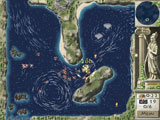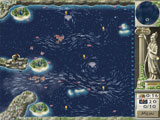Hardware Effects Physics vs. Gameplay Physics
HardOCP just posted an article exploring the distinction between hardware acceleration for “effects” physics, which typically run on the GPU, and “gameplay” physics, which typically run on dedicated silicon such as Ageia’s PhysX hardware. The issue with today’s GPU physics is that it’s difficult to hook into meaningful events within the physics simulation. You could simulate 20,000 bullets from a Gatling gun, but you wouldn’t be able to know when those bullets were striking targets in order to deal damage in your actual game system (when I asked a Havok rep about this at GDC, I was told the easiest solution is to do your own collision detection based on the objects’ positions, which seems like a lot of legwork).
The article interviews representatives from ATI, NVIDIA, Havok, and AGEIA. It ends with a predication that hardware-accelerated physics simulation will gain some serious traction over the next two years:
There is already one dedicated hardware processor on the block; Ageia with their PhysX processor. On the GPU side of things we believe that Windows Vista’s DX10 and DX10 GPUs will be the real start of physics acceleration on the PC using GPUs. Even though today’s GPUs are capable of effects and gameplay physics acceleration DX10 GPUs are really better suited for them. Hopefully 2007 and its released gaming titles will give us a much better look at just how hardware enabled physics will push gaming evolution.
Read the entire article for all the details.
Sail Away With The Odyssey: Winds of Athena
The Odyssey: Winds of Athena is a slick downloadable physics games by the aptly-named Liquid Dragon. The company’s technological bent is fluid dynamics, and they’ve used their fluid solver to power this casual action/puzzle title. The game’s official description is:
Step into the shoes of the Goddess Athena and help guide Ulysses’ fleet to safety. Fend-off Cyclopes, Harpies and more while creating currents and winds to lead the boats to their destination.
Game Structure
The goal of Odyssey is straightforward. Boats enter the single-screen world from a designated starting point, and it’s your job to make sure they reach the designated exit intact. To this end you can control the wind (with a neat gesture-based clockwise/counterclockwise mouse rotation) or click and drag to affect currents in the water.
The fluid dynamics in Odyssey are excellent. Interacting with the currents is intuitive, and the resulting motion is predictable. Of course, when you’re dealing with fluid dynamics it’s easy to generate eddies and whirlpools. This can sometimes be frustrating, since it can be difficult to keep your boats moving forward.
Creating Challenge
Liquid Dragon has added a number of obstacles to the game to make it more difficult. Some of them, like the whirlwinds, have an effect on the fluid system. Many of the obstacles, though, are primarily targets for user clicks. In later levels, birds will fly in to pick up your ships, cyclops will throw rocks, and so on. To stop them, you simply need to click on the birds or rocks. While these mechanisms are effective at making the game more difficult, I feel they distract you from the interesting physical aspects of the fluid dynamics (although it does make the requirement of holding the mouse down for a few seconds to change wind speed very significant). I would much rather have seen more designs that interact with and influence the fluid solver than arbitrary click-on-this challenges.
The levels also add a puzzle element through the use of gates, which introduce keyed locks. Touching a pillar of one color with a ship will open gates of the corresponding color. Primarily you need to open gates to let your ships pass through, although in later levels opening gates will also open and close streams that influence the current movement. Again, I would have preferred to see more puzzles based around modifying the currents.


(Odyssey: Winds of Athena Game Screenshots)
Game Design Pacing Issues
The concept of The Odyssey: Winds of Athena is fantastic. There are other games that use fluid solvers, like Plasma Pong, but Odyssey is unique. I don’t think I’ve seen another game quite like it. The implementation has some rough spots, though. In particular the pacing is very lopsided. Typically, a handful of boats will end up as stragglers. This requires cleanup at the end of the level which dampens the feeling of success. It’s annoying when you’re forced to keep playing after you’re mentally finished the stage.
Give it a Whirl!
All things considered, though, Odyssey is a well-produced, unique title. For me, the game was more novel than addictive, but I’m sure it will be more appealing to others. There’s a free 60-minute trial version available, so there isn’t an excuse not to try it out.
Download The Odyssey: Winds of Athena Game (10.9 MB)
The full version is $19.99 and available at Liquid Dragon’s website.
Related Posts:
« Previous Page



 My name is Matthew Wegner, and this site is dedicated to physics games.
My name is Matthew Wegner, and this site is dedicated to physics games.